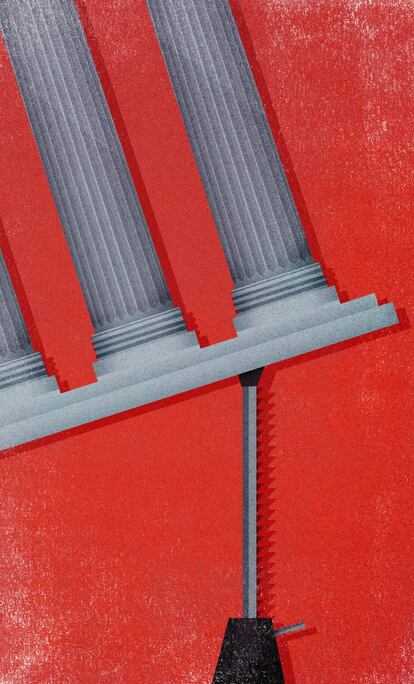Back to normal in Catalonia?
Spain needs structural changes that do not seem forthcoming in light of the prime minister’s apathy and lack of initiative by other political leaders


Ever since the Spanish Senate approved the takeover of Catalan self-government by central authorities in the autumn of last year, there has been a unanimous cry in Catalonia for things to go back to normal. Both the government and the parties that applauded Article 155 on one hand, and pro-independence leaders on the other – not to mention the hefty group of talk show habitués who populate the media – have insisted that this return to whatever each considers normal would come from the elections and subsequent creation of the new parliament to emerge from the ballot boxes.
If by normal we mean to abide by the norm, which in a state guided by the rule of law means the law itself, then court decisions and the Spanish Constitution will guarantee a return to normal. But the social and political fracture lines running across Catalonia, and between Catalonia and the rest of Spain, will take years to heal in the best of cases, so it is hard to imagine anything remotely resembling an immediate return to normal in Spanish politics, which has sustained wounds that could be lethal if proper measures are not taken.
Now that high-running emotions have somewhat subsided, if only through implementation of law and order, several leaders are insisting on the need to discuss the issues that citizens really worry about: the future of pension payments, job creation, the fight against corruption, and so on. And while this is absolutely true, most of those problems are caused by failures in a system that needs to be revamped. Democracy is above all a method, a formality that guarantees, among other things, that the end does not justify the means. And if its rules do not serve to deal with fundamental problems, then those rules need to be reformed.
Spanish politics has sustained wounds that could be lethal if proper measures are not taken
The way things stand today, several million Spanish citizens, nearly a third of the census, are voting for political groups that are openly hostile to this system, which they blame for inequality and injustice, for acts of aggression against all kinds of identities, and for depriving large population segments of their rights (some go so far as to say of their liberties). It’s the kind of revolution of the “indignados” that keeps Donald Trump in the White House, takes Britain out of Europe, gives wings to the far right in Poland and Hungary and leaves the interests and dreams of a bunch of Catalan plutocrats in the hands of the squatter movement. In short, these difficulties illustrate an institutional crisis of representative democracy, which takes on specific characteristics in Spain, but not so much that we could not apply nearly universal solutions.
We have a country governed by a minority party whose main short-term tactics consists of doing as much damage as possible to its main partner in government, which it relies on almost entirely for effective governance; we have a fragmented and disoriented left that works with slogans instead of ideas and favors verbosity over projects; we have a court agenda for 2018 that suggests we could soon be seeing a royal in-law going to prison for stealing public money, while a former deputy prime minister and several ex-ministers from the current governing party have been, or could be, convicted of corruption and sentenced to jail.
Several million Spanish citizens, are voting for political groups that are openly hostile to this system
There are also five members of the former Catalan government who have fled to avoid action by the justice system, while others could be invested into office but be forced to hold this office from within a prison cell. And of all the honorable Catalan nationalists who have held the highest office in the region during contemporary democracy, only the briefly-serving but unforgettable Tarradellas has ever avoided being summoned to court. Considering what’s happened with Jordi Pujol, who went from being a major figure of the Spanish Transition to something of a mafia boss, or with Carles Puigdemont, a buffoon presiding over his own personal Barataria [an imaginary island awarded to Sancho Panza in Don Quixote], to talk about a return to normal in Catalonia implies a commendable determination, and remains a pending subject that could take a decade of efforts and permanent evaluations before we get a passing grade.
Surveys underscore that citizen concern about the Catalan process is in decline, not doubt as a result of the weariness felt by public opinion. People have understood that the unity of Spain is not at risk because the power of the state guarantees it, but they may not be aware of the threat looming over the coexistence model arising from the 1978 Constitution. Words and memories overwhelm us when we recall how thanks to this constitution, our country has experienced an unprecedented period of economic growth, personal freedoms and global influence such as Spain had not enjoyed for centuries. But our model is under threat from a new form of centralism that is a reflex reaction to the popular revolts encouraged by seditious leaders in Catalonia. The successes of our democracy are attributable to the existence of a state made up of autonomous communities, and it bears repeating that any errors or excesses are largely due to Madrid’s refusal to meet its obligations in exchange for parliamentary support from [nationalist leaders] who later decided to become outlaws. In a word, to the lack of a federal power to guarantee mutual solidarity and loyalty between the various parts that make up the Spanish state.
Reforming the Constitution is a top necessity if we are to consolidate the future of the 1978 regime
It was over five years ago now, on a September day, that [former Catalan premier] Artur Mas came to Madrid to deliver a speech at the Ritz hotel and to meet with [Prime Minister Mariano] Rajoy, whom he asked for fiscal autonomy for Catalonia. I had the chance to meet with Mas privately after his visit at La Moncloa, and I was witness to his personal conviction when he launched what would become the Catalan independence process, at a time when he felt the support of large-scale street demonstrations. I warned him then about the extreme reaction that his attitude could trigger in what is often termed “the deep Spain,” a bastion of Spanish nationalist sentiment, as strong if not stronger that Catalan nationalist sentiment. But he showed contempt for my remarks about waking the sleeping lion, whose roars he said he had already heard, as they were easily confused with some editorial opinions being published in right-wing newspapers; Mas insisted that suspending Catalan self-rule would be a senseless thing to do, that he didn’t think it would ever happen. I insisted that Catalan nationalists often accuse foreign observers of failing to properly grasp events in Catalonia, and they may be right on many counts, but that Catalan nationalists should not ignore those who tell them that they, too, neither understand nor are able to accurately gauge the feelings and political attitudes of other Catalans and of a majority of Spaniards. Recent events have provided ample evidence of this.
All of which means that a return to business as usual in Catalan and Spanish politics requires structural changes of the kind that do not seem forthcoming in light of the prime minister’s apathy and the lack of initiatives emanating from the main leaders across the political spectrum in parliament. Reforming the Constitution is not one of several possible options, as the governing party feels, but rather a top necessity if we are to consolidate the future of the 1978 regime. Several months ago already, Professors Muñoz Machado and Aja made some proposals that deserve greater attention and consideration than we have seen to date. It is necessary to reinforce the state model based on autonomous communities, recognizing its federal nature and giving it the tools required to guarantee solidarity and efficient action. It is imperative to review Title VIII of the Constitution, to overhaul the Senate – whose top contribution to this country’s autonomous communities has been, ironically, to suspend self-rule in one of them – and to eliminate constitutional protection for provinces as electoral constituencies if we are to revitalize our political life and deal with so-called real problems, as though social fracture, corporate flight, and declining tourism and investment rates were not real problems. Such changes would pave the way, in a not-too-distant future, for a review of the Catalan Statute of Autonomy, and of any other regional charters, and for calling a legal referendum in which citizens could express their support for the model that defines the relationship with the rest of Spain.
The best argument heard from Mariano Rajoy to defend his opposition to these ideas, or at least to delay them as much as possible, is that “all this is a mess.” Want to talk about a real mess? How about the mess we are in right now as a result of failing to undertake reforms in due time, and always looking the other way.
Juan Luis Cebrián is chairman of EL PAÍS and a member of the Royal Spanish Academy.
English version by Susana Urra.
Tu suscripción se está usando en otro dispositivo
¿Quieres añadir otro usuario a tu suscripción?
Si continúas leyendo en este dispositivo, no se podrá leer en el otro.
FlechaTu suscripción se está usando en otro dispositivo y solo puedes acceder a EL PAÍS desde un dispositivo a la vez.
Si quieres compartir tu cuenta, cambia tu suscripción a la modalidad Premium, así podrás añadir otro usuario. Cada uno accederá con su propia cuenta de email, lo que os permitirá personalizar vuestra experiencia en EL PAÍS.
¿Tienes una suscripción de empresa? Accede aquí para contratar más cuentas.
En el caso de no saber quién está usando tu cuenta, te recomendamos cambiar tu contraseña aquí.
Si decides continuar compartiendo tu cuenta, este mensaje se mostrará en tu dispositivo y en el de la otra persona que está usando tu cuenta de forma indefinida, afectando a tu experiencia de lectura. Puedes consultar aquí los términos y condiciones de la suscripción digital.








































